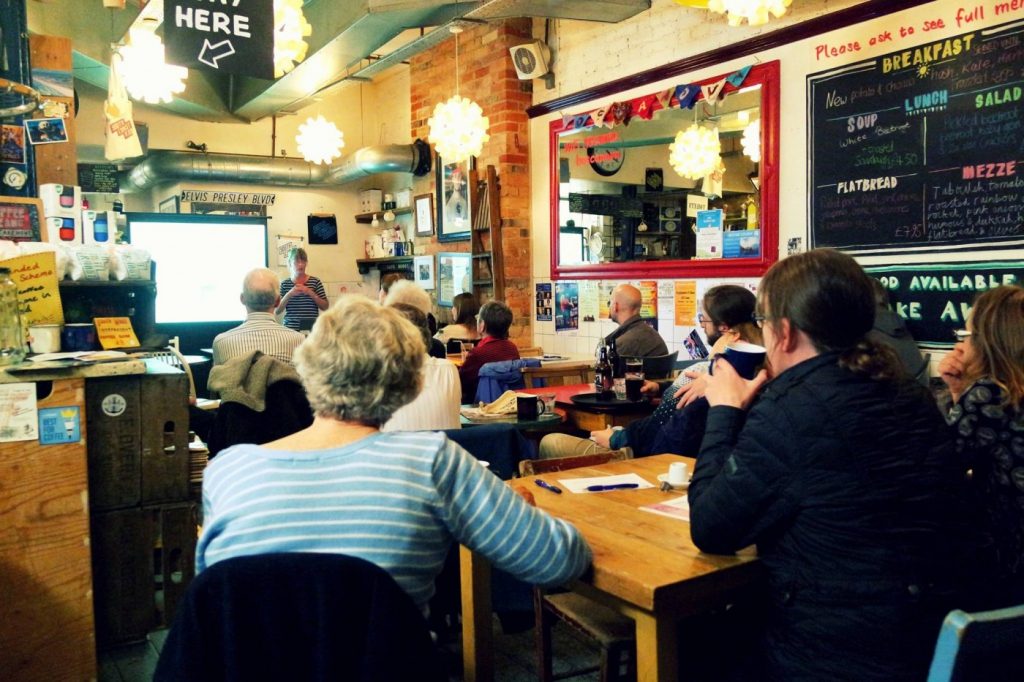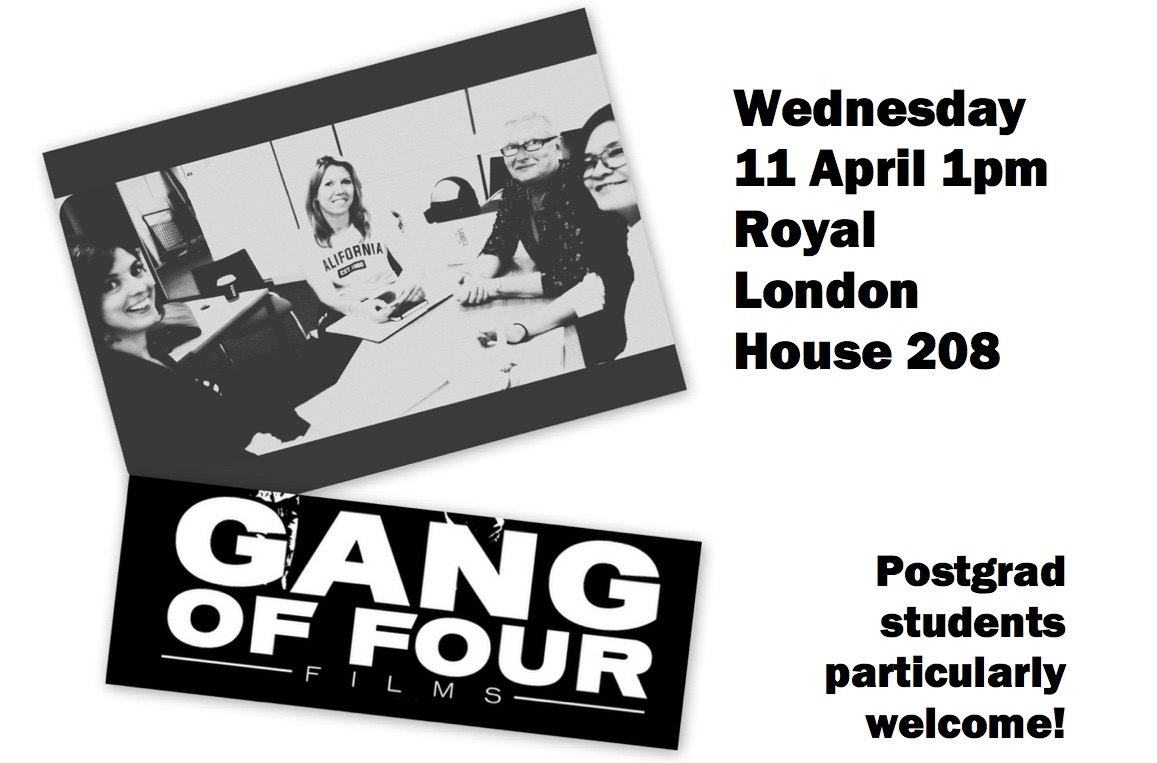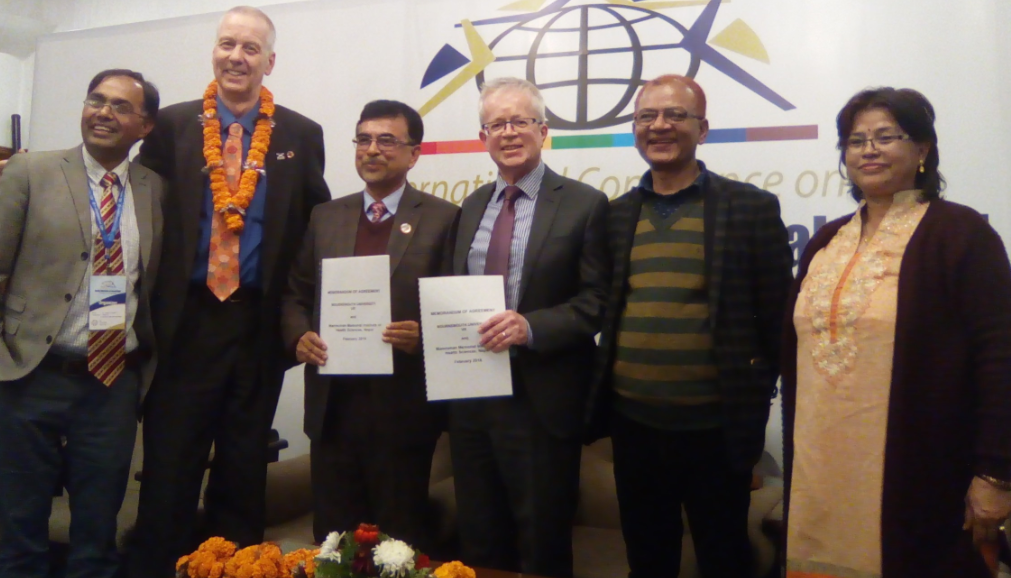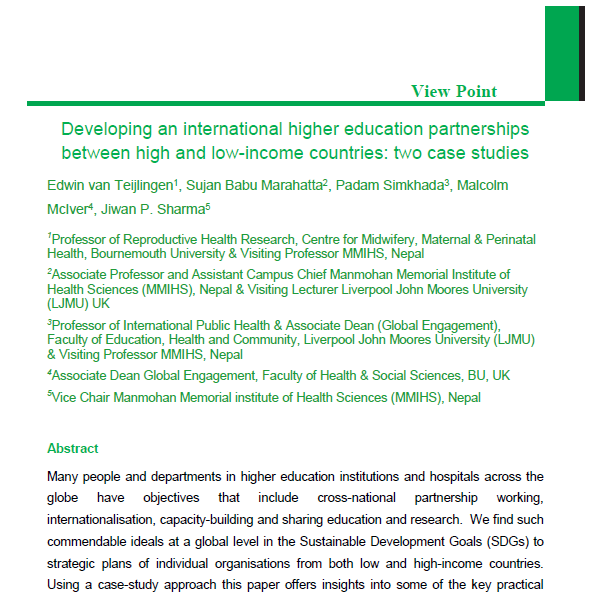
Catch the Gang of Four postgrads this Wed!

Latest research and knowledge exchange news at Bournemouth University

Charlotte is a midwife and in her first year of doctoral studies in FHSS, exploring the impact that living on a low income has on women’s experiences of pregnancy, maternity care and parenting.
Charlotte recently applied to BU’s ‘destination summer school programme’ in Indonesia and her application was successful. The programme will take place at the BINUS University in Jakarta, Indonesia in June 2018 and is designed for students from BU and BINUS University to work together on projects that address one or more of the Sustainable Development Goals (SDG). The SDG’s are a collection of 17 goals set by the United Nations for countries to work towards achieving. The goals are interrelated although each has its own targets and they cover a broad range of social and economic development issues. These include poverty, hunger, health, education, climate change, gender equality, water, sanitation, energy, environment and social justice. Charlotte says, ‘Collaborating with others on these projects will foster the development of my global mind-set and enhance my competence as a researcher interested in health and social sciences research’.
programme will take place at the BINUS University in Jakarta, Indonesia in June 2018 and is designed for students from BU and BINUS University to work together on projects that address one or more of the Sustainable Development Goals (SDG). The SDG’s are a collection of 17 goals set by the United Nations for countries to work towards achieving. The goals are interrelated although each has its own targets and they cover a broad range of social and economic development issues. These include poverty, hunger, health, education, climate change, gender equality, water, sanitation, energy, environment and social justice. Charlotte says, ‘Collaborating with others on these projects will foster the development of my global mind-set and enhance my competence as a researcher interested in health and social sciences research’.
Charlotte applied to the programme for the opportunity to develop her knowledge of issues such as poverty and gender equality, both of which are relevant to her research topic. In order for Charlotte’s research to be impactful and authentic she believed it important to listen to and learn from others and hopes the summer school programme will assist her in achieving this. Charlotte will translate the knowledge gained from the experience into her own research and competence as an early-career researcher. Charlotte looks forward to being able to share these experiences with you all on her return.

Professor Jens Holscher has been invited to join the editorial board of the new Journal of Banking, Finance and Sustainable Development by the editor in chief, Professor Richard Werner (University of Southampton).

 #TalkBU is a monthly lunchtime seminar on Talbot Campus, open to all students and staff at Bournemouth University and free to attend. Come along to learn, discuss and engage in a 20-30 minute presentation by an academic or guest speaker talking about their research and findings, with a Q&A to finish.
#TalkBU is a monthly lunchtime seminar on Talbot Campus, open to all students and staff at Bournemouth University and free to attend. Come along to learn, discuss and engage in a 20-30 minute presentation by an academic or guest speaker talking about their research and findings, with a Q&A to finish.
Often our New Year resolutions involve changing unhealthy habits in the coming year. But how many of us have actually managed to change our unhealthy lifestyle and maintained it? Changes can be stressful, but how one manages the change can potentially ease that stress and make the change more achievable, which can potentially impact our physical and psychological well-being.
In this talk, Dr Fiona Ling will discuss her research that centres around physical activity behaviour change, and the extended implications on changing other health habits and public health promotions in order to encourage a healthy lifestyle.
When: Thursday 19 April at 1 – 2pm
Where: Room FG04, Fusion Building
Click here to find out more about our future and previous #TalkBU events.

We are looking for two academics to fill our Cafe Scientifique spots in June and July. If you would like to get involved please email the Public Engagement team!
Check out the website to find out more about Cafe Scientifique.

Changes have been made to the NERC Research Grants & Fellowships Handbook in February 2018.
The important changes include:
For a clean copy of the NERC Grants Handbook 2018, please click here.
For a summary document outlining the above changes and an annotated NERC Grants Handbook, please contact Alice Brown, details can be found on the Funding Development Team page.

Every year, the Research & Knowledge Exchange Office, along with internal and external delivery partners, runs over 150 events to support researcher development through the Research & Knowledge Exchange Development Framework (RKEDF).
Responding to your feedback and by popular request, below are the main events coming up over the next two months – please click on the event titles that are of interest to find out more and reserve your place as soon as possible:
Thursday 5th April – The BU Protocol of Academics Engaging with Business
Tuesday 10th April – Grants Workshop & Follow-up Bid Writing Retreat Day 1 of 2
Wednesday 11th April – STEAMlab 3: Industrial Challenges (N.B. This event welcomes non-BU attendees)
11th, 12th & 13th April – Writing Academy
Tuesday 17th April – Research Ethics @ BU
Wednesday 18th April – Open data and the need for research data management plans, Getting started on applying for research funding, Pre-award finances, BU processes for applying for funding and Quality approvals at BU
Thursday 19th April – International Funding – Working with ASEAN countries
23rd & 24th April –An Introduction to Statistic Analysis with SPSS (Intermediate Session)
25th & 26th April – MSCA IF bid writing retreat – 2 days
Wednesday 2nd May – Introduction to the Royal Academy of Engineering – Visit
Wednesday 2nd May – EU funding outside Horizon 2020
Tuesday 8th May – Grants Workshop & Follow-up Bid Writing Retreat Day 2 of 2
Wednesday 9th May – Wellcome Trust- Visit
Wednesday 9th May – KTPs – an introduction
Monday 14th May – Fellowship Interview Training – Royal Academy of Engineering
Wednesday 16th May – Applying for funding from NIHR – an Overview of the Schemes Available (N.B. This event welcomes non-BU attendees)
Wednesday 16th May – Introducing and Evidencing Research Impact: the Basics
Thursday 17th May – Engaging with policy makers
Friday 18th May – Preparing impact case studies for the Research Excellence Framework: a workshop
Tuesday 22nd May – Writing Academy – Writing Day
Wednesday 23rd May – What is the Research Excellence Framework?
To see all the events within the RKEDF and the wider Organisational Development offering, please refer to the handy Calendar of Events.

The result was an enhanced depth of understanding of specific interpretive research methodologies as well as an unexpected support mechanism.
The group’s primary function was to support development of its understanding of methodologies and methods, but an unexpected secondary function was the reduction of a sense of isolation.
United through the fundamental overarching field of narrative research, four doctoral candidates with distinct topic areas were able to collaborate. They not only enhanced their depth of understanding of specific interpretive research methodologies, but also provided support and encouragement to each other within the potentially isolating experience of postgraduate research study.

Congratulations to Mananya Podee (FHSS) and Yolanda Barrado-Martín (FST)!
Great to see both of your papers accepted meaning that BU research to improve the lives of people with dementia and their families will be presented at the British Society of Gerontology 47th Annual Conference ‘Ageing in an Unequal World: Shaping Environments for the 21st Century’ in Manchester in July.
Mananya from the Centre for Qualitative Research (CQR) and the Ageing and Dementia Research Centre (ADRC) will present a paper on ‘Improving holiday accommodation and service provision for people with dementia’. Yolanda from the ADRC and the Psychology Department will present a paper on ‘How is Tai Chi received by people living with dementia and their informal carers?’ based on her work on the TACIT Trial.
Both studies are searching for more people with dementia and their carers to take part. If this sounds like something you might like to get involved in (or you know someone else that might) please contact them for further information.
12 Journal Editors will join Bournemouth University prestigious CHME2018 conference
27th Council for Hospitality Management Education (CHME) Annual Research Conference –
Innovation in Hospitality: connecting all stakeholders to deliver memorable experiences
22-25 May 2018 Bournemouth University, UK www.bournemouth.ac.uk/CHME
Professor Levent Altinay, Editor in Chief, Service Industries Journal, Oxford Brookes University, UK
Professor Clayton Barrows Editor of the International Journal of Hospitality & Tourism Administration, University of New Hampshire, USA
Professor Dimitrios Buhalis, Editor in Chief, Tourism Review, Bournemouth University, UK
Professor Cihan Cobanoglu Editor in Chief Journal of Hospitality and Tourism Technology, University of South Florida, USA
Professor Ulrike Gretzel Associate Editor, Annals of Tourism Research, University of Southern California, USA
Professor Jay Kandampully, Editor, Journal of Service Management, Ohio State University, USA
Dr Peter Lugosi, Reviews Editor, Hospitality & Society, Oxford Brookes University, UK
Professor Fevzi Okumus, Editor-in-Chief, International Journal of Contemporary Hospitality Management, University of Central Florida, USA
Professor Hanqin Qiu,Editor-in-Chief, Journal of Quality Assurance in Hospitality and Tourism, Nankai University, China
Dr Ioannis Pantelidis, Co-Editor-in-Chief, Journal of Tourism and Hospitality Research, University of Brighton, UK
Professor Bruce Tracey, Editor-in-Chief, Cornell Hospitality Quarterly, Cornell University, USA
Professor Perry Hobson, Editor-in-Chief, Journal of Vacation Marketing, Taylor’s University, Malaysia
They will hold two workshops during the conference
Tuesday 22 May 16:00-17:30 Research Publication Retreat Meet the Editor and Publish high impact papers
Friday 25 May 15:30-17:00 Research and Knowledge cocreation, REF2021 and publications
Please contact Dr Hanaa Osman or Professor Dimitrios Buhalis if you are interest in joining CHME2018 or those workshops.
22-25 May 2018 Council for Hospitality Management Education
CHME 2018 Conference Bournemouth University http://www.bournemouth.ac.uk/CHME
Provisional programme https://www1.bournemouth.ac.uk/sites/default/files/asset/document/CHME2018Programme.pdf
 The Doctoral College would like to present the April monthly update.
The Doctoral College would like to present the April monthly update.
This monthly update is for PGRs and their supervisors outlining upcoming research skills and development opportunities including events, workshops and networking opportunities supported by the Doctoral College.
In this update we would like to congratulate the winners of the 10th Annual Postgraduate Research Conference and share highlights of the conference in the video below. The deadline for 3 Minute Thesis (3MT®) applications has been extended, Researcher Development Programme workshops for the remainder of the academic year are available to book via myBU: Doctoral College Community and check out the Doctoral College Facebook page and Researcher Development Hub for more regular updates on all Researcher Development opportunities.
We report here on a successful programme of research, involving engagement with public policy, aimed at reducing the scourge of economic crime. If accepted the proposals made would have a substantial impact on frauds involving major companies, especially those in the financial services sector.
Economic crime takes many forms: from traditional manifestations of fraud, bribery, money-laundering and tax evasion to modern slavery and human-trafficking offences providing forced labour. Striking at the heart of global security, funding terrorism and political espionage, it also inflicts direct costs to businesses and economies, nationally and world-wide. Fraud alone is calculated to have cost the UK economy c. £190 billion (2017) while global estimates reveal a loss of £2.75 trillion (2013).
Focusing on corporate criminality, in March 2017, we responded to the Ministry of Justice Call for Evidence on Corporate Liability for Economic Crime. We argued that the current preference for corporate liability premised on the company’s failure to prevent criminal misconduct, as exemplified in the Bribery Act 2010, has little application in the context of widespread frauds emanating from “criminogenic” corporate cultures. Central to our proposals were a unique approach to attributing corporate dishonesty, through the adoption of a Criminal Practice Direction, and a shift of resources from regulation and compliance to investigation and prosecution of serious fraud.
In March and April 2018, we went on to publish our full results in a series of two articles in the Company Lawyer: New models of corporate criminality: the development and relative effectiveness of “failure to prevent” offences; and New models of corporate criminality: the problem of corporate fraud – prevention or cure? The General Editor of The Company Lawyer is Professor Barry Rider, Cambridge University, who was honoured in 2014 with the award of an OBE for services to the prevention of economic crime.
The research for these articles was wide-ranging with many questions that needed to be asked, from the definition of fraud itself and the scale of economic crime to the relative effectiveness of models that could be employed to tackle corporate fraud. Traditional “black letter” law research was useful for some aspects, for example, the analysis of the Bribery Act 2010 and its extension in the Criminal Finances Act 2017 in relation to offshore tax evasion. Other questions required substantial historical research, such as the law’s response to the particular problem of bribery and the precedents for the successful use of a “failure to prevent” model of criminality. The impact of reforms and potential reforms required a detailed analysis of recent prosecutions and the use of deferred prosecution agreements.
On Sunday 18th March 2018, the Independent reported Solicitor-General Robert Buckland MP as saying there is a “strong case” for a new corporate economic crime offence. We anticipate that our timely research will prove valuable in shaping the debate as to what the law should be and how it can be made to work.
Dr Stephen F Copp, Associate Professor, Law Department
Dr Alison Cronin, Senior Lecturer, Law Department
The Research and Knowledge Exchange Office (RKEO) through the Research & Knowledge Exchange Development Framework (RKEDF) have a number of workshops in the coming  months to assist you in developing and enhancing the impact that you can make with your research, with particular reference to the REF.
months to assist you in developing and enhancing the impact that you can make with your research, with particular reference to the REF.
Please follow the links above to find out more and to book. You will then receive a meeting request giving the room location. Many of these events have input from external presenters; please ensure that you are in the room and ready to commence at the given start time.
If you would like to discuss impact outside these workshops, please contact the RKEO Knowledge and Impact Team.
None of us can avoid meetings…
Then think how magnificent it would be if every single one was purposeful and powerful – sharing information, making decisions, identifying actions – but just without there being so many of them, or them taking so long!
In this session, we’ll use the 9 Characteristics of the Productivity Ninja™ to inspire change in your meeting skills, and you’ll identify specific ways your team can implement each of them, providing the opportunity to think about what makes effective, productive and fun meetings, and gives you the ideas and tools to make that happen.
Find out more and book your place now for the afternoon of Wednesday, 18th April 2018. This session, for BU Staff, will be at the Lansdowne Campus, with the location given in your booking confirmation.
Please also take a look at the external facilitator’s video, which introduces this workshop.
Find out about further events from the RKEDF and other Organisational Development workshops on the Staff Development & Engagement Events Calendar.
 BU is preparing submissions for units of assessment (UOAs) for REF 2021. Preparation for each UOA is led by a UOA Leader who is supported by an Impact Champion and an Output Champion. From March 2018, UOA Leaders are recruited via an open and transparent process. All academic staff have the opportunity to put themselves forward for UOA Leader roles. The roles are until December 2020.
BU is preparing submissions for units of assessment (UOAs) for REF 2021. Preparation for each UOA is led by a UOA Leader who is supported by an Impact Champion and an Output Champion. From March 2018, UOA Leaders are recruited via an open and transparent process. All academic staff have the opportunity to put themselves forward for UOA Leader roles. The roles are until December 2020.
We are currently seeking expressions of interest (EoIs) from academic staff interested in leading preparations for two UOAs:
UOA Leaders serve a term up to December 2020, although they can choose to step down during this time. The UOA Leader undertakes a vital role in driving and delivering BU’s REF submission, influencing the University’s preparations, shaping optimal submissions for each UOA and ultimately having a significant effect on BU’s REF 2021 results.
Key responsibilities of the UOA Leader role include:
Being a UOA Leader is a big commitment and is recognised accordingly. UOA Leaders are given time to attend meetings and take responsibility for tasks. As such potential applicants should discuss their workload balance with their Head of Department before applying.
Application process:
To apply for either role, please submit a short statement (suggested length 300 words) stating which role you are interested in and explaining your interest in the role and what you could bring to it. This should be sent by email to Julie Northam by 5pm on Thursday 12 April 2018.
The EoIs will be reviewed by a gender balanced panel comprising a DDRPP and a member of the professoriate. Applicants successful at this stage will be invited to an interview with the same panel.
The selection criteria used at EoI and interview stage are outlined below. Each criterion carries a total possible score of 5. The role will be offered to the highest scoring applicant. A member of the panel will provide feedback to all applicants.
Questions:
Questions regarding the process should be directed to Julie Northam (Head of RKEO).
UOA-specific questions should be directed to Prof Vanora Hundley (Deputy Dean for Research in HSS) or to Prof Tiantian Zhang (Deputy Dean for Research in FST)
Association for Psychosocial Studies Biennial Conference
5th-7th April 2018, The Fusion building, Talbot Campus, Bournemouth University
‘Psychosocial Reflections on a Half Century of Cultural Revolution: The 50th anniversary of seasons of love and protest’
Keynote Speakers:
Barry Richards (BU), Gail Lewis (Birkbeck) Lynne Segal (Birkbeck) Sally Alexander (Goldsmiths) Liz Frost (UWE)
Join us to reflect on revolutionary relationships and revolutionary politics which challenged authority then and which influence us now.
The cultural forces and the political movements of 1967 and 1968 aimed to change the world, and did so. Recent development of some populist and protest politics could be seen as a continuation of the revolutionary movements in the 1960s. Hedonic themes that recall the summer of love suffuse contemporary life, and self-reflection and emotional literacy have also become prominent values, linked towards human diversity and the international community.
We have over 37 panels that include interdisciiplinary academic papers from renowned international scholars from the spheres of history, politics, feminism, psychoanalysis, sociology and also art, digital media, poetry and social dreaming workshops and film screenings . On Friday evening there is a public engagement Cabaret event with poetry, music and comedy and everyone is welcome!
Here is the conference website:
http://aps2018.bournemouth.ac.uk/
Here is the link to tickets and registration:
The promotional code for BU staff reduced tickets:
BUSTAFFBU18
Hope to see you there and please do circulate to colleagues!
Candida Yates (Conference Chair)
Prof of Culture and Communication, BU
 As part of the new plan BU2025, “we want to continue to develop our global partnerships and links with other institutions and organisations”. This is an admirable aim, and it is, of course, the best way forward for a truly global Higher Education Institution like Bournemouth University (BU). But to translate this general aim into a particular global partnership we need to consider the underlying processes of initiating and developing such partnerships. We published a paper [1] on the issues one needs to consider in developing a partnership, based on the example of BU’s partnership with Manmohan Memorial Institute of Health Sciences (MMIHS) in Nepal.
As part of the new plan BU2025, “we want to continue to develop our global partnerships and links with other institutions and organisations”. This is an admirable aim, and it is, of course, the best way forward for a truly global Higher Education Institution like Bournemouth University (BU). But to translate this general aim into a particular global partnership we need to consider the underlying processes of initiating and developing such partnerships. We published a paper [1] on the issues one needs to consider in developing a partnership, based on the example of BU’s partnership with Manmohan Memorial Institute of Health Sciences (MMIHS) in Nepal.

In late February this year MMIHS signed a Memorandum of Agreement (MoA) with BU at a ceremony in the Nepalese capital Kathmandu, where Prof. Stephen Tee represented BU. This MOA is an agreement between us that provides a basis on which the parties will consider potential future collaboration. The UoA formalises a long-standing collaboration between the two institutions, and indicates a desire to collaborate further in the future. MMIHS and BU academics have jointly applied for research grants, conducted collaborative research and published together and it is exactly this personal link between people that allows this, and many other, global partnerships to flourish.
Prof. Edwin van Teijlingen
Centre for Midwifery, Maternal & Perinatal Health
Reference:
 Every BU academic has a Research Professional account which delivers weekly emails detailing funding opportunities in their broad subject area. To really make the most of your Research Professional account, you should tailor it further by establishing additional alerts based on your specific area of expertise. The Funding Development Team Officers can assist you with this, if required.
Every BU academic has a Research Professional account which delivers weekly emails detailing funding opportunities in their broad subject area. To really make the most of your Research Professional account, you should tailor it further by establishing additional alerts based on your specific area of expertise. The Funding Development Team Officers can assist you with this, if required.
Research Professional have created several guides to help introduce users to ResearchProfessional. These can be downloaded here.
Quick Start Guide: Explains to users their first steps with the website, from creating an account to searching for content and setting up email alerts, all in the space of a single page.
User Guide: More detailed information covering all the key aspects of using ResearchProfessional.
Administrator Guide: A detailed description of the administrator functionality.
In addition to the above, there are a set of 2-3 minute videos online, designed to take a user through all the key features of ResearchProfessional. To access the videos, please use the following link: http://www.youtube.com/researchprofessional
Research Professional are running a series of online training broadcasts aimed at introducing users to the basics of creating and configuring their accounts on ResearchProfessional. They are holding monthly sessions, covering everything you need to get started with ResearchProfessional. The broadcast sessions will run for no more than 60 minutes, with the opportunity to ask questions via text chat. Each session will cover:
Each session will run between 10.00am and 11.00am (UK) on the fourth Tuesday of each month. You can register here for your preferred date:
These are free and comprehensive training sessions and so this is a good opportunity to get to grips with how Research Professional can work for you.
 By clicking on this box, on the left of the Research Blog home page just under the text ‘Funding Opportunities‘, you access a Research Professional real-time search of the calls announced by the Major UK Funders. Use this feature to stay up to date with funding calls. Please note that you will have to be on campus or connecting to your desktop via our VPN to fully access this service.
By clicking on this box, on the left of the Research Blog home page just under the text ‘Funding Opportunities‘, you access a Research Professional real-time search of the calls announced by the Major UK Funders. Use this feature to stay up to date with funding calls. Please note that you will have to be on campus or connecting to your desktop via our VPN to fully access this service.